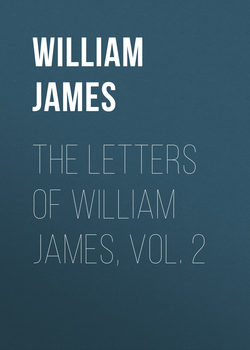Читать книгу The Letters of William James, Vol. 2 - William James - Страница 22
XI
To Dickinson S. Miller
ОглавлениеLake Geneva, Wisconsin, Aug. 30, 1896.
Dear Miller,—Your letter from Halle of June 22nd came duly, but treating of things eternal as it did, I thought it called for no reply till I should have caught up with more temporal matters, of which there has been no lack to press on my attention. To tell the truth, regarding you as my most penetrating critic and intimate enemy, I was greatly relieved to find that you had nothing worse to say about "The Will to Believe." You say you are no "rationalist," and yet you speak of the "sharp" distinction between beliefs based on "inner evidence" and beliefs based on "craving." I can find nothing sharp (or susceptible of schoolmaster's codification) in the different degrees of "liveliness" in hypotheses concerning the universe, or distinguish a priori between legitimate and illegitimate cravings. And when an hypothesis is once a live one, one risks something in one's practical relations towards truth and error, whichever of the three positions (affirmation, doubt, or negation) one may take up towards it. The individual himself is the only rightful chooser of his risk. Hence respectful toleration, as the only law that logic can lay down.
You don't say a word against my logic, which seems to me to cover your cases entirely in its compartments. I class you as one to whom the religious hypothesis is von vornherein so dead, that the risk of error in espousing it now far outweighs for you the chance of truth, so you simply stake your money on the field as against it. If you say this, of course I can, as logician, have no quarrel with you, even though my own choice of risk (determined by the irrational impressions, suspicions, cravings, senses of direction in nature, or what not, that make religion for me a more live hypothesis than for you) leads me to an opposite methodical decision.
Of course if any one comes along and says that men at large don't need to have facility of faith in their inner convictions preached to them, [that] they have only too much readiness in that way already, and the one thing needful to preach is that they should hesitate with their convictions, and take their faiths out for an airing into the howling wilderness of nature, I should also agree. But my paper wasn't addressed to mankind at large but to a limited set of studious persons, badly under the ban just now of certain authorities whose simple-minded faith in "naturalism" also is sorely in need of an airing—and an airing, as it seems to me, of the sort I tried to give.
But all this is unimportant; and I still await criticism of my Auseinandersetzung of the logical situation of man's mind gegenüber the Universe, in respect to the risks it runs.
I wish I could have been with you at Munich and heard the deep-lunged Germans roar at each other. I care not for the matters uttered, if I only could hear the voice. I hope you met [Henry] Sidgwick there. I sent him the American Hallucination-Census results, after considerable toil over them, but S. never acknowledges or answers anything, so I'll have to wait to hear from someone else whether he "got them off." I have had a somewhat unwholesome summer. Much lecturing to teachers and sitting up to talk with strangers. But it is instructive and makes one patriotic, and in six days I shall have finished the Chicago lectures, which begin tomorrow, and get straight to Keene Valley for the rest of September. My conditions just now are materially splendid, as I am the guest of a charming elderly lady, Mrs. Wilmarth, here at her country house, and in town at the finest hotel of the place. The political campaign is a bully one. Everyone outdoing himself in sweet reasonableness and persuasive argument—hardly an undignified note anywhere. It shows the deepening and elevating influence of a big topic of debate. It is difficult to doubt of a people part of whose life such an experience is. But imagine the country being saved by a McKinley! If only Reed had been the candidate! There have been some really splendid speeches and documents....
Ever thine,
W. J.
